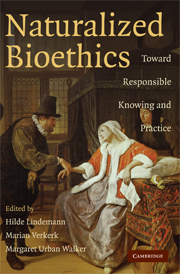Book contents
- Frontmatter
- Contents
- Contributors
- Acknowledgments
- Naturalized Bioethics
- Introduction: Groningen Naturalism in Bioethics
- I RESPONSIBLE KNOWING
- 1 Moral Bodies: Epistemologies of Embodiment
- 2 Choosing Surgical Birth: Desire and the Nature of Bioethical Advice
- 3 Holding on to Edmund: The Relational Work of Identity
- 4 Caring, Minimal Autonomy, and the Limits of Liberalism
- 5 Narrative, Complexity, and Context: Autonomy as an Epistemic Value
- 6 Toward a Naturalized Narrative Bioethics
- II RESPONSIBLE PRACTICE
- Bibliography
- Index
5 - Narrative, Complexity, and Context: Autonomy as an Epistemic Value
Published online by Cambridge University Press: 05 June 2012
- Frontmatter
- Contents
- Contributors
- Acknowledgments
- Naturalized Bioethics
- Introduction: Groningen Naturalism in Bioethics
- I RESPONSIBLE KNOWING
- 1 Moral Bodies: Epistemologies of Embodiment
- 2 Choosing Surgical Birth: Desire and the Nature of Bioethical Advice
- 3 Holding on to Edmund: The Relational Work of Identity
- 4 Caring, Minimal Autonomy, and the Limits of Liberalism
- 5 Narrative, Complexity, and Context: Autonomy as an Epistemic Value
- 6 Toward a Naturalized Narrative Bioethics
- II RESPONSIBLE PRACTICE
- Bibliography
- Index
Summary
Those masterful images because complete
Grew in pure mind, but out of what began?
A mound of refuse or the sweepings of a street,
Old kettles, old bottles, and a broken can,
Old iron, old bones, old rags, that raving slut
Who keeps the till. Now that my ladder's gone,
I must lie down where all the ladders start
In the foul rag and bone shop of the heart.
— W. B. Yeats, “The Circus Animals' Desertion”Human beings are not at the pinnacle of intelligence, smarter than other animals, far smarter than plants, farther still from rocks and other non-living things. It is, in fact, the other way around: the rocks, being oldest, know the most, followed by plants and by animals older than we are. As the youngest, the most recent inhabitants of this place, we humans are the most ignorant and have the most to learn from our elders.
— Paraphrased from Paul Schultz, Elder, White Earth band of OjibweIn Margaret Drabble's novel The Sea Lady (2006), a man and a woman in late middle age travel toward a small city on the English coast, near where they met as children, to receive honorary doctorates and — as it turns out, not coincidentally — to meet for the first time in thirty years. They had parted after a brief and disastrous marriage following a love affair that, in its intensity of both passion and happiness, shadowed the rest of their lives.
- Type
- Chapter
- Information
- Naturalized BioethicsToward Responsible Knowing and Practice, pp. 106 - 124Publisher: Cambridge University PressPrint publication year: 2008
- 3
- Cited by



